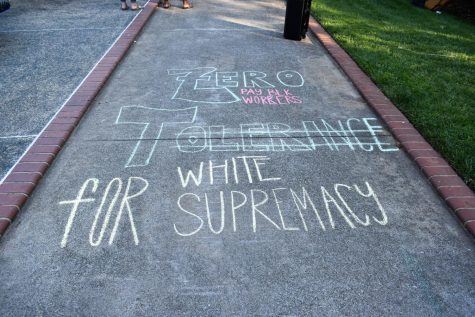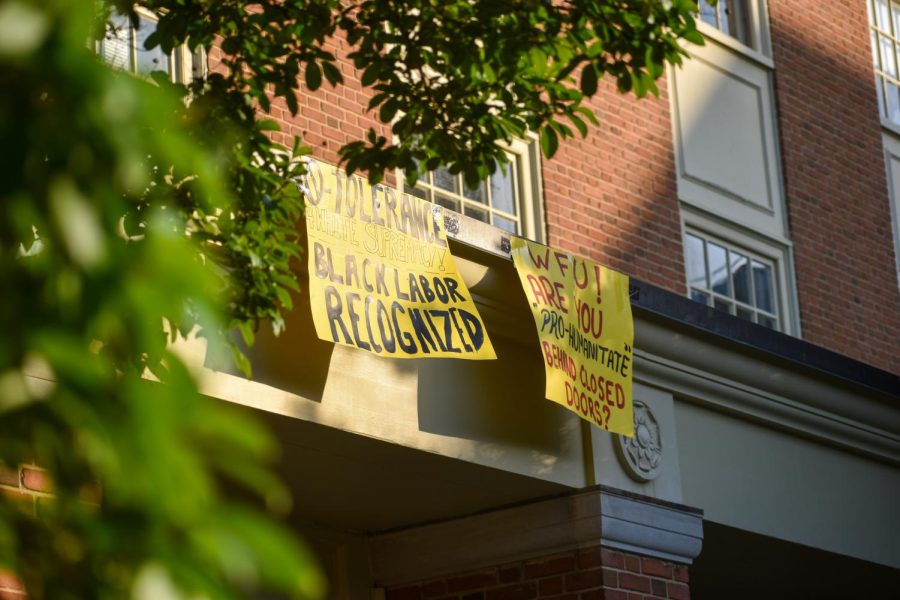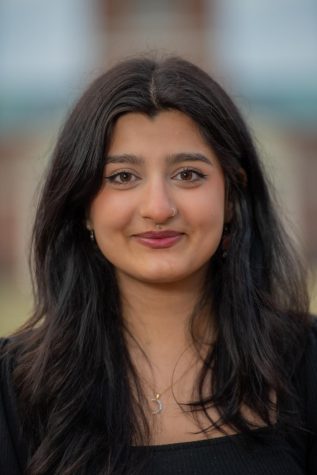At speak out, students call attention to invisible labor
The organizers of the speak out also released a “People’s Strategic Plan” aimed at combatting anti-blackness and injustice
The speak out focused on the often invisible labor done by Black students, faculty and staff on Wake Forest’s campus.
April 30, 2022
At 6 p.m. on Thursday, April 28, students, faculty and administrators attended a speak out in Tribble Courtyard addressing the unrecognized labor of the Black community on campus.
Organized by a group of Wake Forest students, the event aimed to center the experiences of Black women. The speak out was entitled “This Bridge Called My Back” after a book of the same name, which is compiled by Cherríe Moraga and Gloria E. Anzaldúa.
Black students, faculty members and staff were given the opportunity to express their experiences with marginalization before the attendees of the speak out by coming up to the center of the courtyard and detailing their stories on a microphone. A journal and a survey link were also provided for members of the community to write down their experiences, which were then presented anonymously by the organizers of the event.
Attendees of the speakout also wrote messages in chalk on the ground in Tribble Courtyard and around campus, including statements such as “zero tolerance for white supremacy” and “so much invisible labor got you here & keeps you here”.
To conclude the speak out, students organizing the event presented a five-year plan for Wake Forest, called the “People’s Strategic Plan”, which coincides with the university’s strategic planning this fall. The plan aims to eradicate white supremacy and elevate Black feminist pedagogy.
The “People’s Strategic Plan” is characterized by five central objectives: 1) establishing a zero-tolerance policy for white supremacy in culture and policy, 2) committing to zero police officers on campus, 3) holding to the highest standards for labor rights, 4) reinvigorating accountability and transformative justice for students, faculty and staff and 5) equalizing social policies for students and social organizations.

In the introduction to the plan, students stated, “we challenge the university to integrate this blueprint into its larger vision and demand that these are imbued throughout its decisions”.
Senior Bea Pearson, who led the speak out, expressed frustration regarding how the speak out was an annual event but never seemed to garner attention, despite the fact that it addressed lasting and pervasive problems facing the Black community on campus.
“One of my biggest goals was cultivating community space for Black people, particularly for Black girls to pour their hearts out,” Pearson said. “This is the space to do that.”
Pearson continued: “This kind of thing doesn’t really get a lot of attention. I’m honestly frustrated even with the Old Gold & Black. They didn’t cover my event last year. I submitted an article for them to post this year, and it just didn’t go up on the website. Often we have to do things for us, by us, because otherwise, they go unnoticed.”
“The absence of Ms. Pearson’s article is not a willful ignorance of the speak out,” Connor McNeely, editor-in-chief of the Old Gold & Black, said. “The Old Gold & Black is committed to providing coverage of the speakout event and has offered Ms. Pearson the opportunity to publish her remarks in a letter.”
Some students spoke about how expectations of Black students involved with university scholarship programs were higher than those for white students who received the same scholarship. Sophomore Iyana Trotman spoke about how students in similar situations felt silenced.
“The scholarship programs at Wake Forest force Black kids to engage in only respectability politics and ignore the level of trauma and experiences Black kids have at Wake Forest in order to force them to perform,” Trotman said. “I think it’s really important for Black women to share this space because we are constantly invisibilized here, and we’re always shut down.”
Issues with Aramark and the Budd Group
The speak out also spotlighted Wake Forest’s partnerships with Aramark — the university’s food and dining facilities provider — and The Budd Group, the university’s facility service staff provider. The speakers called for Wake Forest to end their contracts with each of these companies and re-hire the staff provided by these companies, allowing them to receive a liveable wage and employee benefits.
“Pay Black women, pay Black labor and end your contract with Aramark and The Budd Group,” sophomore Rute Ayalew said. “Stop taking advantage of their cheap services because they are able to provide them [for so cheap] by not paying their workers liveable wages. Hire them yourselves, pay them directly and stop taking advantage of slave-rate services.”
According to a PBS article posted in 2017, Aramark Corporation has been embroiled in numerous controversies pertaining to the mistreatment of employees and even sexual harassment. According to an op-ed published by The Daily Tarheel, the University of North Carolina at Chapel Hill’s student newspaper, Aramark’s offenses include “large pay cuts after employee onboarding, starving employees during their shifts and failing health code checks.”
In July 2020, students at Meredith College in Raleigh, N.C., began a petition on change.org calling for their college to end its contract with Aramark. The petition listed a number of grievances held by the student body against Aramark, including how the company capitalizes on mass incarceration and provides food that is both low-quality and insufficient in quantity to inmates.
On August 21, 2009, these same issues with the company triggered a riot at the Northpoint Training Center in Kentucky. Furthermore, during Black History Month in 2018, Aramark curated a menu consisting of “fried chicken, kool-aid, collard greens and other stereotypical ‘Black’ foods”, to be served at New York University, Fordham University, Loyola University in Chicago and Kent State University. In 2015, the state of Michigan canceled its three-year contract with the company due to some of these issues.
Administration Response
Dean of Students and Associate Vice President Dr. Adam Goldstein, was also in attendance at the speak out.
“These are students speaking their truth, and everybody should be here and interested in hearing that truth,” Goldstein said. “When these events happen, I always feel a mixture of sadness about where our community is and the experiences that our students have had and resolve to continue to try and make our community a better one.”
He continued: “The resolve is that we need to be in this constant state of educating around who we are, around the use of the bias system so that some of the events that were talked about come to our attention, and we can try to address them. Not just in providing care for someone that’s been harmed but to identify better ways to prevent future harm, which are all principles of that system. I want to be present, and I want to hear. I think a critical part of doing this work is knowing where students are.”
“The People’s Strategic Plan” also references the bias system, particularly its insufficiency. The plan calls for the establishment of “formal procedures for the redressing of harm — not simply ‘bias’ – that are accessible to students, staff and faculty alike.”
Moreover, the plan demands “ongoing evaluations and revisions of the bias reporting system and process, including hiring dedicated transformative and restorative justice coordinators with the expertise, experiences, skill and energy to produce long-term change in the culture and individuals of Wake Forest.”















